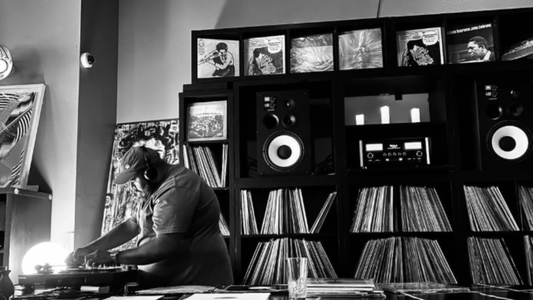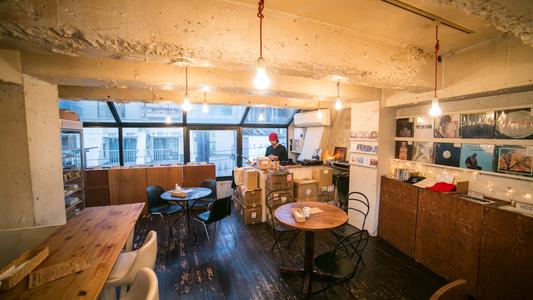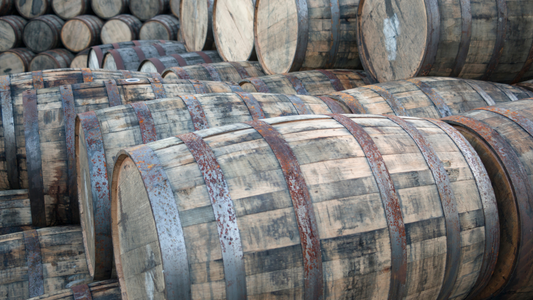
Faraday — Madrid’s Everyday Frequency
By Rafi Mercer
New Listing
Venue Name: Faraday
Address: Calle de San Lucas 9, 28004 Madrid, Spain.
Website: thisisfaraday.com
Instagram: @faradaymadrid
There’s a moment in every city where the rhythm drops just enough for you to hear yourself think. In Madrid, that moment lives at Faraday — a vinyl café in the heart of Chueca that has quietly become one of the city’s most distinctive listening spaces. It isn’t loud or large or late. It’s precise.
Walk through the doorway on Calle de San Lucas and the light changes: soft gold, filtered through tall windows onto birch wood and brushed concrete. The espresso machine hisses, a turntable hums, and the soundscape takes shape — clarity without force. The room feels measured, balanced, the air tuned as carefully as the coffee it carries.

Faraday calls itself simply “Music & Coffee.” That understatement hides a full architecture of care. The sound system was designed for fidelity over loudness: a pair of Klipsch Heresy IV floor-standing speakers driven by Yamaha integrated amplification, with an Audio-Technica AT-LP7 turntable and Ortofon cartridge setup at the heart of the counter. The sound is warm, physical, alive — just enough to fill the café without claiming it. When the stylus lands, conversation softens; the music occupies its own temperature.
The owners — long-time friends and record collectors Raúl López and Pablo Cortés — built Faraday in 2018 as a response to Madrid’s growing appetite for both specialty coffee and slow listening. They had travelled through Tokyo’s jazz kissaten and Berlin’s hi-fi cafés, and wanted to create a space where quality and curiosity could coexist. “We didn’t want a bar,” Raúl once said in an interview. “We wanted a room where sound mattered as much as flavour.”
By day, the menu reads like a love letter to European coffee craftsmanship. Single-origin beans rotate weekly — Ethiopian, Colombian, Rwandan — roasted locally and served as hand-drip, Aeropress or espresso. Every pour is framed by a vinyl record playing somewhere behind the counter. By late afternoon, the music takes the lead. The playlists — always analog — become the language of the room.
Faraday’s vinyl sessions are informal but deeply curated. Fridays are often Blue Note Fridays — a rotation of hard-bop and cool-jazz sessions: Hank Mobley, Art Blakey, Horace Silver. Saturdays drift into more cosmic zones: Brian Eno, Air, Khruangbin, and vintage Mediterranean library music. Sundays tend to get soulful — Bill Withers, Aretha Franklin, Caetano Veloso, maybe a hidden groove from a 70s Brazilian pressing. There’s no DJ booth, no schedule, no announcement. Whoever’s pouring might also be playing, cueing up a record they’ve just cleaned and queued by hand.
It’s that intimacy that gives the room its character. You can see the record spinning, hear the texture of the needle’s landing, smell the crema of the espresso at the same time. Each sensory layer reinforces the others. There’s a kind of quiet choreography to it — a soft exchange between barista and listener.
Design plays its part too. The walls are acoustically treated with wood slats and fabric to diffuse high frequencies; the tables are close enough for conversation but arranged to avoid echo. Even at full capacity, there’s an enveloping calm. Outside, Madrid moves in 4/4 — traffic, laughter, clatter — but inside, the rhythm slows to something like 33⅓ rpm.
The clientele is mixed but consistent in temperament: designers, musicians, remote workers, and travellers who know the value of stillness. You might see a crate-digger comparing sleeve notes with a journalist editing over headphones. Laptops are allowed, but they don’t dominate. The café feels less like a workspace, more like a shared listening session that happens to serve very good coffee.
What’s beautiful is the restraint. Faraday doesn’t lean into nostalgia or gimmick. The records aren’t props. The music changes hourly but never jars. Sometimes a regular will bring a record to play — last week, someone dropped a near-mint copy of Marvin Gaye’s “I Want You.” Another brought a 1969 Japanese pressing of Miles Davis’ “In a Silent Way.” Each record changes the mood just slightly, and the café absorbs it like light.
There’s no official food menu beyond pastries, but even those are considered — croissants from Panem, matcha biscuits, small chocolate tartlets, all presented simply. Drinks expand into teas and natural juices, and by evening, Faraday occasionally hosts tasting events pairing coffee with records: Ethiopian Yirgacheffe alongside Mulatu Astatke, Colombian roast with Joe Bataan, Sumatra beans with Nujabes. It’s a sensory synesthesia that feels entirely natural here.
As the sun drops over Chueca, the gold tones fade into amber, the needle lifts, and someone changes the record. The crowd doesn’t rush; they listen, sip, turn pages, talk softly. You start to understand what makes Faraday special — not its menu or its décor, but its restraint. It’s a café that understands space, and that sound doesn’t always have to fill it.
Stepping back onto San Lucas, the city reclaims its noise, but your hearing stays tuned. The world feels more dimensional. You catch a street musician’s chord and realise how warm it sounds; you hear footsteps on tile like percussion. That’s the Faraday effect — a recalibration of attention. You don’t just leave with caffeine; you leave with ears reset.
Rafi Mercer writes about the spaces where music matters. For more stories from Tracks & Tales, subscribe, or click here to read more.














